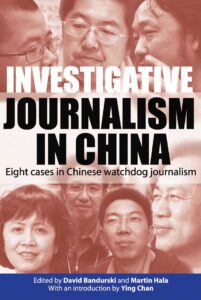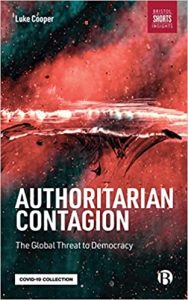The advanced democracies are inaugurating a tougher approach toward Chinese inbound investment and generally adopting more hawkish foreign policies toward Beijing’s sharp power, says a leading analyst.
They are responding to authoritarian regimes’ efforts to cripple democracies and threaten fundamental freedoms, says a sponsor of the proposed Madeleine K. Albright Democracy in the 21st Century Act.
 The relatively new phenomenon of economic coercion, especially in the metastatic form now seen in Beijing’s punitive actions against Lithuania, will require new defensive tactics, adds Martin Hála, director of AcaMedia and Sinopsis.cz, and coeditor of Investigative Journalism in China.
The relatively new phenomenon of economic coercion, especially in the metastatic form now seen in Beijing’s punitive actions against Lithuania, will require new defensive tactics, adds Martin Hála, director of AcaMedia and Sinopsis.cz, and coeditor of Investigative Journalism in China.
The politically motivated, undeclared sanctions against open, export-oriented economies present a threat that only a collective international response—restructuring supply chains, for example—can mitigate. Over the last two decades, we allowed our economic openness to become a vulnerability. We now know that trade and investment are as liable to manipulation as are our political systems, and we must respond accordingly, he writes for the Journal of Democracy.
Sharp power uses democratic societies’ openness against them. But Beijing is discovering that openness can also pose a major risk. Martin Hála examines the case of East Central Europe. https://t.co/dMKZTsTjBf pic.twitter.com/SN16pIjD9G
— Journal of Democracy (@JoDemocracy) July 27, 2022
China’s deteriorating public image, statist economics, and isolation are not going to fully stop its continued economic rise, its military modernization, or Xi Jinping’s consolidation of power, while its increasingly skillful use of “sharp power” will likely also remain unaffected, says Council on Foreign Relations expert Joshua Kurlantzick.

National Endowment for Democracy (NED)
Yet Beijing’s collapsing popularity is having immense ramifications for China in many areas, he writes for The Diplomat:
For one, as Beijing becomes more of a pariah, especially in the wake of the Russian invasion of Ukraine, China is losing significant trade supporters in other countries, such as Germany’s major industrial groups… Similar slowdowns in foreign direct investment into China are happening from the U.S., some Asian democracies, and other European states beyond Germany, as their trade organizations increasingly divorce themselves from advocating for China, and as governments become more antagonistic toward Beijing.
The latest wave of authoritarianism – ‘authoritarian protectionism’ – comes with a splash of ethno-nationalism, analyst Luke Cooper contends in his latest book, Authoritarian Contagion.
 Over the past decade, the Chinese Communist Party has ramped up its influence campaigns in democratic societies, notes CSIS. Nowhere has this been more keenly felt than in Australia, where Beijing’s efforts to silence critics of China and amplify the voices of individuals and institutions supporting China, have been felt across the political, business, academic and civic spectrum.
Over the past decade, the Chinese Communist Party has ramped up its influence campaigns in democratic societies, notes CSIS. Nowhere has this been more keenly felt than in Australia, where Beijing’s efforts to silence critics of China and amplify the voices of individuals and institutions supporting China, have been felt across the political, business, academic and civic spectrum.
To understand how Australia has responded, and to discuss lessons that the experience might hold for other democracies, join the CSIS Australia Chair Charles Edel on August 18 at 5 p.m. EDT (August 19, 7 a.m AEST) for a discussion with three leading experts on foreign interference—John Fitzgerald, Emeritus Professor, Australian Strategic Policy Institute and Swinburne University of Technology; John Garnaut, Senior Risk Advisor, McGrathNicol; and human Rights Watch researcher Sophie McNeill.
“Democratic Responses to Foreign Interference: Learning from Australia’s Experience.”
Thursday, August 18, 2022 5:00 pm – 6:00 pm EST
Friday, August 19, 2022 7:00 am – 8:00 am AEST







